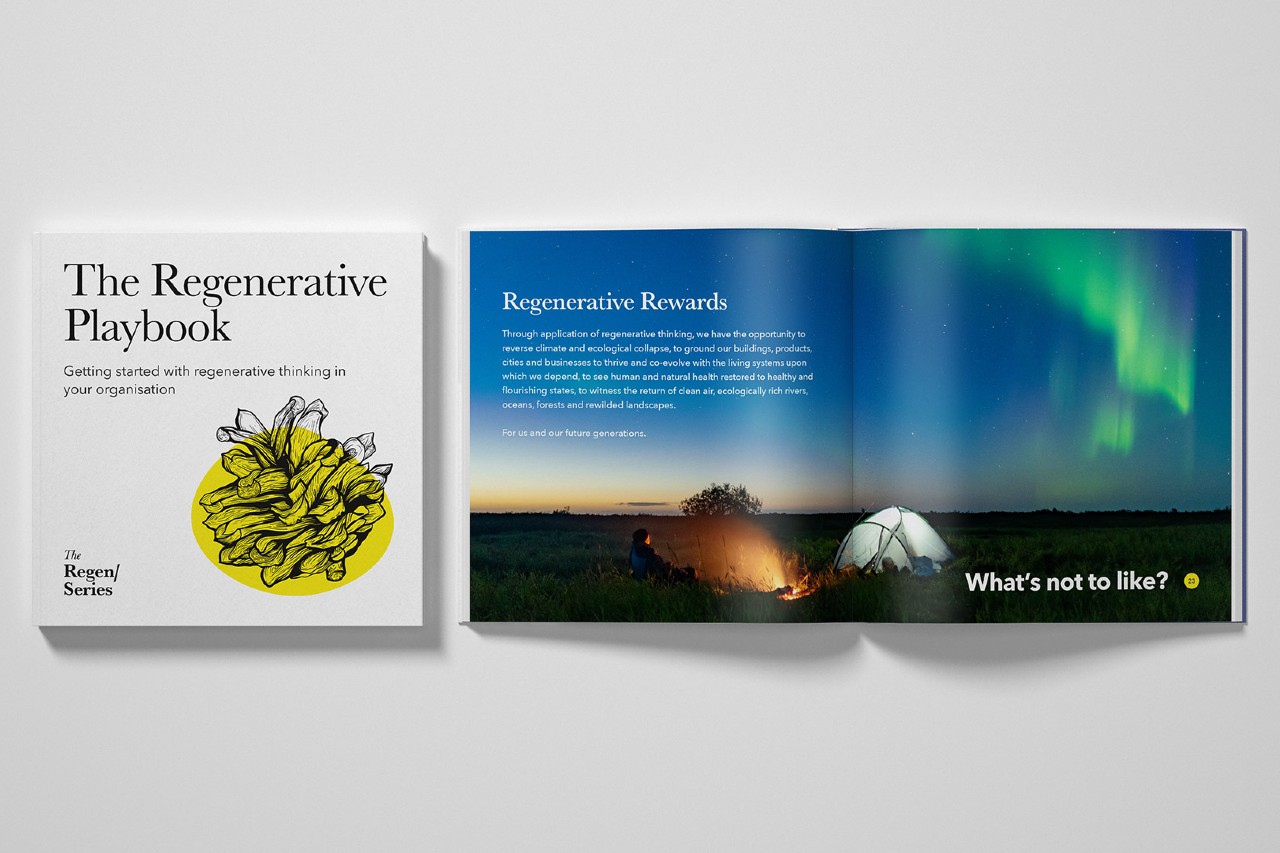
- By Content Coms
- In Company
“Positive, powerful, radical and practical”: Giles Crosse reviews The Regenerative Playbook
Sustainability is no longer an add on; businesses are beginning to deliver a future defined not by doing less harm, but by doing more good. What does the latest collaborative project from leading regenerative voices Martin Brown, Anna Williamson and Content Coms have to teach us? We asked our environment editor Giles Crosse, (who is also a well-established environmental journalist), to review our latest collaborative project, The Regenerative Playbook.
When I began writing on sustainability, some 25 years ago, it was something that came at the end of the chain. An afterthought to profit. A sedative for wild green campaigners. A soft option to soothe our collective sense of responsibility. Do a bit of recycling. Pile up some compost.
No longer. Sustainability today is essential, present and undeniable. As are climate change, terrifying futures for our children and the presently unavoidable upheaval of society as it exists.
I have often noted the Earth will be fine without humanity. It will simply reset over eons to its naturally balanced state; we just won’t be here. But there may be an alternative.
Regenerative sustainability, for many people, is it. Definitions of this new sustainability vary, but most seek to mirror nature’s natural sharing and interdependency, not to seek to do less harm, but rather to eliminate any harm and treble the good; to repair both the natural world and humans systemically and act deeply and restoratively for profit and joy of every kind.
Sustainability today is essential, present and undeniable
Sound a bit highbrow for you? Fear not, guides are in place to what will soon be the living actions we define as sustainable.
The Regenerative Playbook
This new guide handily kicks off regenerative thinking for organisations and individuals new to the concept. It will teach you what regenerative means, and how to apply it to yourself, your work and those around you.
Regenerative, notes, the Playbook, ‘Is not just something that we do, but rather something we are or become.’ This definition is key because it makes a nonsense of the concept that unprofound actions can achieve meaningful consequences.
True regenerative sustainability is an ongoing process of learning, experimentation, iteration and mirroring of nature. Its purpose is of a continual curve of improvement towards a more fully realised life.
By contrast, regenerative is not, comprehensively, an outsourced recycling project run by a US firm in a UK city to use up the end of the Council’s yearly green budget. Something presently occurring in a spot near me.
Perhaps a simpler quote from the Regenerative Playbook can illustrate these ideas further. ‘It is through being regenerative that we will improve both what we do and who we are in respect of the climate, economic and social challenges we face.’
True regenerative sustainability is an ongoing process of learning, experimentation and mirroring of nature.
‘Another world is not only possible, but she is on her way. On quiet days I can hear her breathing.’ [Arundhati Roy.] When it comes to sustainability, there is indeed beauty and learning in the silence.
Practical regenerative tips
The Regenerative Playbook recommends asking questions, learning about the interdependencies of the living world and the corporate world, while nurturing the potential of humans and communities to be sources of healthier mindsets and healthier businesses.
Further, it encourages companies to seek solutions, products and services which are better for both human and planetary health, and therefore by definition more likely to achieve long term success.
It contains a framework for CEOs, Sustainability Officers, SMEs and more to start doing this, via simple tips, summaries, activities and challenges that intriguingly ask the reader to consider how they are feeling at all times too.
All of this should make it faster, easier and simpler for business leaders to deliver change and as importantly to futureproof sustainability and see what’s next on the horizon.
And of course, the Regenerative Playbook also explains today’s corporate world, from environmental and social governance (ESG), to Science Based Targets (SBTs) and Sustainability Roadmapping. This isn’t a guide that tears up the tools we have, but seeks to define them more fundamentally at the core of regenerative thinking.
The final word
The Regenerative Playbook is positive, powerful, radical and practical, not a simple accomplishment in a short guide. It has much to offer readers at all stages in their sustainability journey and is not solely a panacea for business profit, but far more crucially a homage to business, natural and human fulfilment.
Something which strikes your correspondent as intriguing is the ability of existing societal pillars and concepts to realign regeneratively. Namely, can capitalism every be truly regenerative. For decades, its core component has been exploitative and short-termist and this core dependency continues today.
This may be among the key challenges for regenerative thinking, to redefine our societal pillars and cathedrals without demolishing them entirely and with them the good they can achieve, thereby bringing our own walls crashing down upon us.
‘We have the opportunity to reverse climate and ecological collapse, to ground our buildings, products, cities and businesses, to thrive and coevolve with the living systems upon which we depend, to see human and natural health restored to flourishing states.’ closes the Playbook. A vision worth the deepest of consideration.
Interested? You can download a copy of The Regenerative Playbook here. (If you’d like to buy a hard copy, please let us know.
About the author
Giles Crosse has been our Environment Editor since 2015. When he’s not writing for us, he’s a Bristol-based writer and journalist specialising in the sustainability and ethical business space. Previously published by the BBC, Economist and Guardian, Giles has also blogged for the United Nations, researching and writing throughout spells probing the depths of the Peruvian Amazon, Madagascar and Cambodia.

